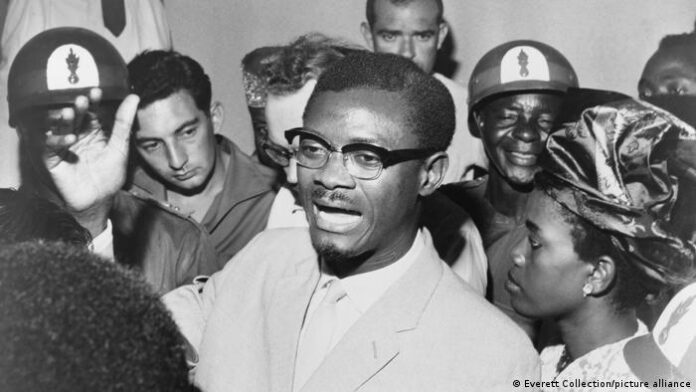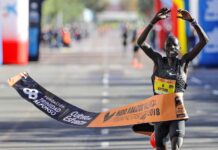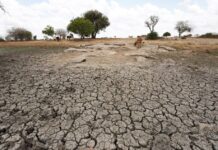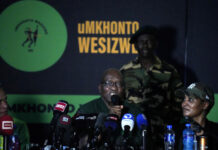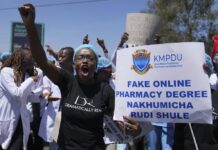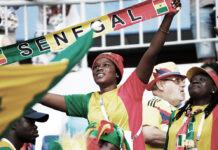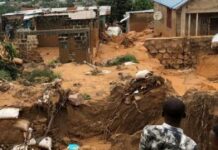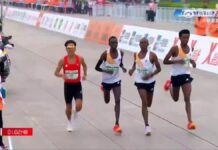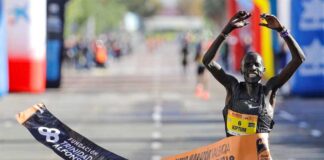Patrice Lumumba is best known for becoming the first prime minister of the newly independent Democratic Republic of the Congo in 1960, for being forced out of office after less than three months, and for being assassinated the following year.
As in Onalua village in the centre of today’s Democratic Republic of Congo, where Lumumba was born on July 02 1925, the community in Kisangani awaited the remains of the independence hero, executed in January 1961, four months after the end of his brief term in office.
In the presence of Belgium’s King Baudouin, the 34-year-old prime minister accused the former colonial masters of racist maltreatment and forcing “humiliating slavery” on the Congolese people, making him an instant hero of African independence movements.
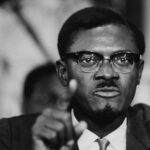 Patrice Lumumba’s coffin arrived on Sunday in Haut-Katanga in the south-east of the Democratic Republic of Congo where a wake is being held at the site of the independence hero’s murder.
Patrice Lumumba’s coffin arrived on Sunday in Haut-Katanga in the south-east of the Democratic Republic of Congo where a wake is being held at the site of the independence hero’s murder.
After a rest in his native village, the coffin of the former Congo’s first post-independence prime minister Friday pursued its memorial journey to the northeastern city of Kisangani. A single tooth is all that remains of the young scholar and nationalist politician whose life and career were cut short in a dark struggle for leadership and control of resources in Zaire.
In 1956 Lumumba was invited with others on a study tour of Belgium under the auspices of the minister of colonies. On his return he was arrested on a charge of embezzlement from the post office. He was convicted and condemned one year later, after various reductions of sentence, to 12 months’ imprisonment and a fine.
As nationalist fervour increased, the Belgian government announced a program intended to lead to independence for the Congo, starting with local elections in December 1959. The nationalists regarded this program as a scheme to install puppets before independence and announced a boycott of the elections. The Belgian authorities responded with repression. On October 30 there was a clash in Stanleyville that resulted in 30 deaths. Lumumba was imprisoned on a charge of inciting to riot.
The MNC decided to shift tactics, entered the elections, and won a sweeping victory in Stanleyville (90 percent of the votes).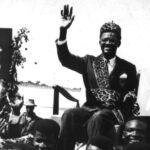
On January 17, 1961, Lumumba and two associates, Joseph Okito and Maurice Mpolo, were flown to Elisabethville (now Lubumbashi), where they were delivered to the secessionist regime in Katanga and its Belgian advisors. On the flight there, they had been beaten by the soldiers escorting them, and, once they landed in Katanga, they were beaten again. Later that day, Lumumba, Okito, and Mpolo were executed by a firing squad under Belgian command. Although their bodies were initially thrown into shallow graves, they were later dug up under the direction of Belgian officers, hacked into pieces, and dissolved in acid or burned by fire.
The Katangan government withheld official announcement of his death until February 13 and then claimed that Lumumba had escaped from their custody and had been discovered by villagers, who killed him. Rumours of Lumumba’s death had circulated soon after it occurred, however. The government’s explanation of his death was quickly disputed, although it would take decades for the full circumstances surrounding his death to be made public.
His body was dissolved in acid after he was killed, but a Belgian police officer kept the tooth as a trophy. Belgian authorities in 2016 seized the relic from his daughter.
Belgium finally returned it on Monday to Lumumba’s family members during a ceremony in Brussels.
It was then placed inside a coffin for the funeral tour, 61 years late.
His death caused a scandal throughout Africa and beyond; retrospectively, even his enemies proclaimed him a “national hero.”
The burial ceremony in Kinshasa is planned for June 30, which is Independence Day.

